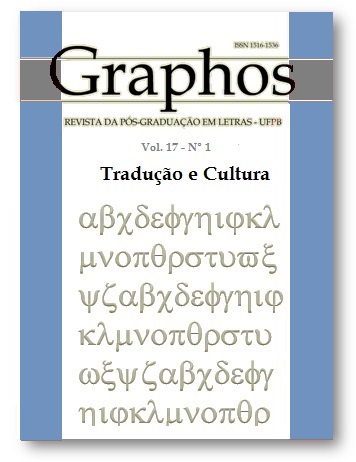Repensando o desenvolvimento da competência tradutória e suas implicações para a formação do tradutor
Keywords:
translation competence, translator training, translation degrees in BrazilAbstract
In Translation Studies, the efficiency of a translator and the quality of his work have been investigated under the translation competence label (eg Schaffner and Adab 2000; PACTE 2003; Pagano, Magalhães and Alves 2005; Alves and Gonçalves 2007). However, there are still relatively few initiatives aiming at applying the findings and conceptual developments of this branch of translation studies to translators’ training. This represents a gap that has proved increasingly problematic, since there is an increasing demand for translations and a number of new undergraduate programs being created in recent years. This paper builds on some theoretical underpinnings by Gonçalves’s (2008), as regards the concept of competence and translation competence. Thereafter, it discusses and reformulates the definitions of the components of translation competence proposed by Gonçalves and Machado (2006), applying them to data collected from translation undergraduate curricular matrices in Brazil in two recent periods – in 2009 and 2014. The main objective is to verify to what extent there is consistency between the curricular proposals and theoretical principles on the subject. Data was collected from institutional information available on the internet. Results point to a changing trend in the general profile of translators’ training curricula in Brazil in recent years. One also concludes that it is necessary to deepen the dialogue, cooperation and coordination among the various agents involved with translation (translators, lecturers, researchers, educational managers) in order to consolidate and improve a proposal for setting up a core of knowledge, abilities and skills required for professional translators’ training in Brazil.
Downloads
References
ALVES, F.; GONÇALVES, J. L. Modularidade maciça, conexionismo e relevância: interfaces cognitivas aplicadas à tradução. In: F. Alves; J. L. Gonçalves (Orgs.). Relevância em tradução: perspectivas teóricas e aplicadas. Belo Horizonte: Faculdade de Letras da UFMG, 2006. p. 9-33.
ALVES, F.; GONÇALVES, J. L. Modelling translator’s competence: relevance and expertise under scrutiny. In: Y. Gambier; M. Schelensiger; R. Stolze (eds.). Translation studies: doubts and directions. (Selected contributions from the IV EST Congress). Amsterdam: John Benjamins, 2007. p. 41-55.
ALVES, F.; MAGALHÃES, C.; PAGANO, A. Traduzir com autonomia: estratégias para o tradutor em formação. São Paulo: Contexto, 2000.
CHOMSKY, N. Current issues in linguistic theory. 5.ed. Haia/Paris: Mouton, 1970. (1 ed. 1964).
EHRENSBERGER-DOW, M. Challenges of translation process research at the workplace. MonTI Monographs in Translation and Interpreting, 7: 355-383, 2014.
ERICSSON, K. A.; KRAMPE, R. T.; TESCH-ROMES, C. The role of deliberate practice in the acquisition of expert performance. Psychological review, v. 100, n. 3, 1993.
GONÇALVES, J. L. O desenvolvimento da competência do tradutor: investigando o processo através de um estudo exploratório-experimental. 2003. 241 f. Tese (Doutorado em Estudos Linguísticos) — Faculdade de Letras da Universidade Federal de Minas Gerais, Belo Horizonte.
GONÇALVES, J. L. Rediscutindo o conceito de competência de uma perspectiva relevantista. In J. Campos; F. J. Rauen (Orgs.). Tópicos em Teoria da Relevância. Porto Alegre: EDIPUCRS, 2008. p. 122-142.
GONÇALVES, J. L. & MACHADO, I. T. N. Um panorama do ensino de tradução e a busca da competência do tradutor. In M. L. Vasconcellos; A. PAGANO (Orgs.). Cadernos de Tradução XVII. UFSC, 2006, p. 45-69.
NEUBERT, A. Competence in language, in languages, and in translation. In C. Schäffner; B. Adab (eds.). Developing translation competence. Amsterdam: John Benjamins Publishing, 2000. p. 3-18.
PACTE. Acquiring translation competence: hypotheses and methodological problems in a research project. In A. Beeby; D. Ensinger; M. Presas (eds.). Investigating translation. Amsterdam: John Benjamins, 2000. p. 99-106.
PACTE. Building a translation competence model. In F. Alves (ed.). Triangulating translation: perspectives in process oriented research. Amsterdam: John Benjamins, 2003. p. 43-66.
PACTE. First results of a translation competence experiment: ‘knowledge of translation’ and ‘efficacy of the translation process’. In: J. Kearns (ed.). Translator and interpreter training: issues, methods and debates. London: Continuum, 2008. p. 104-126.
PACTE. Results of the validation of the PACTE translation competence model: translation problems and translation competence. In: C. Alvstad; A. Hild; E. Tiselius (eds.). Methods and strategies of process research: integrative approaches in translation studies. Amsterdam: John Benjamins, 2011. p. 317-343.
PAGANO, A.; MAGALHÃES, C.; ALVES, F. (orgs.). Competência em Tradução: cognição e discurso. Ed. UFMG: Belo Horizonte, 2005.
PRESAS, M. Bilingual competence and translation competence. In C. Schäffner; B. Adab (eds.). Developing translation competence. Amsterdam: John Benjamins Publishing, 2000. p. 19-32.
ROBINSON, D. Becoming a translator: an introduction to the theory and practice of translation. 2 ed. London/New York: Routledge, 2003.
ROTHE-NEVES, R. Características cognitivas e desempenho em tradução: investigação em tempo real. 2002. 262 f. Tese (Doutorado em Estudos Linguísticos) – Faculdade de Letras da Universidade Federal de Minas Gerais, Belo Horizonte.
ROTHE-NEVES, R. Notes on the concept of translator's competence. In Quaderns. Revista de Traducció, v. 14, p. 125-138, 2007.
SCHÄFFNER, C; ADAB, B. (eds.). Developing translation competence. Amsterdam: John Benjamins Publishing, 2000.







